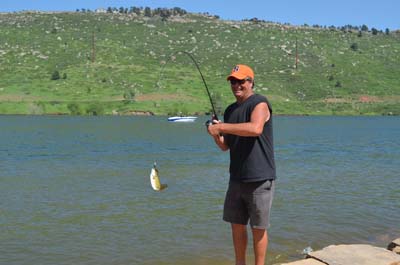As 2020 is winding to a close, I find it very ironic that the January issue of this very magazine’s Fishful Thinker column was all about focus, complete with 2020 vision puns galore. I doubt anybody will miss this year given the unimaginable level of craziness that engulfed society and I’m pretty sure that the one thing that did not ensue was the very focus I originally strove for and wrote about. As I sit here writing this final column of 2020, I’ve surmised that the one bright spot in the whole mess was a major insurgence of people into the outdoors, fishing, camping and re-discovering the wonders of nature. For many it became an escape to simply go fishing.
Now, I know a bunch of life-long anglers who have lamented over “The ‘Rona crowd” as one friend calls these new anglers; after all, us devoted anglers used to have the water to ourselves. For that matter, we used to be able to walk into the fishing department and buy whatever tackle we desired. Alas, the push into the outdoors overwhelmed the supply chain and made fishing tackle, camping gear, boats, kayaks, and basically anything else that can be used to recreate outdoors, very hard to come by. I totally get it, but the outdoors needs the new blood. When I look at it unselfishly, it’s probably been the best thing that has happened to the outdoors in my lifetime so far. So, I have a favor to ask of you, dearest experienced outdoorsman:
Please don’t alienate those that are just discovering what we’ve all known for years; that time in the outdoors, especially in the traditional outdoor pursuits like fishing and hunting, is therapeutic. Why do I ask this of you, especially in a column more commonly associated with nuts and bolts angling skills? Because conservation needs them and hunters and fishermen are the original conservationists.
I ask that you exercise patience, that you consider sharing your knowledge or at very least that you be a good role model for those new faces you see in the woods and on the water.
Those just learning what traditional outdoor experiences can bring to their life are in the fat part of their learning, and they’re impressionable. Now, in their first year of experience, is the time to mold them into future conservationists. For that to happen, first they need to have success in their endeavors; they need to actually catch fish or harvest game. Research has shown that if success does not occur early in angling, their shiny new tackle will ultimately waste away in the garage. Second, they need to observe first-hand what it means to be an ethical, responsible outdoorsman. You cannot prevent them from undertaking the traditional outdoor activities, so lead them by example.
You either already have or undoubtedly will encounter new-to-the-outdoors folks on your outings. Take that as an opportunity to be a positive influence. Gently and respectfully educate them about whatever lessons are relevant. Perhaps toss out a friendly tidbit of fly or lure advice, offer to help them with a skill, maybe educate about selective harvest; geez, you never know what a smile and a bit encouragement might lead to for them, and ultimately the larger picture of long-term conservation.
There are plenty of people who would prefer the outdoors be viewed from afar, that think fishing and hunting should not have a place in modern times, or who generally don’t approve of our lifestyle. Now is our chance to bolster our own reputations in society because many of those discovering the outdoors now were fringe participants before. Maybe they dabbled in hiking or kayaking, but have now discovered fishing. Maybe they camped occasionally but are now thinking of procuring their own venison, which sounds pretty good after experiencing a nationwide meat shortage. Maybe, just maybe, they have kids who will discover Mother Nature’s allure. Regardless of their exact story, they likely have friends with opposite views then us lifelong outdoorsmen and women. This is our chance to sway some of them for the longevity and good of not only our hobbies, but conservation overall. Because only if people truly see the value in something will they protect it. Be positive in your interactions. Kill them with kindness.
 My first published writing ever started with the Fishful Thinker company mantra: “Fishful Thinker is a state of mind, pure and simple; not a person, place, or even genre, rather a mindset that besets those who think fishy thoughts. It’s the relentless quest of knowledge coupled with application, the wave of fishing success and failure, and the countless hours daydreaming of the next opportunity. It’s anticipation, preparation, participation, and reflection, primal yet sophisticated. It’s youthful exuberance and ageless wisdom; a process without end where every answer brings a question, and success leaves one yearning for the next challenge. It’s respect for the quarry, environment, and peers, the sharing of knowledge and the understanding of an angler’s place in the grand scheme, however humbling that may be.”
My first published writing ever started with the Fishful Thinker company mantra: “Fishful Thinker is a state of mind, pure and simple; not a person, place, or even genre, rather a mindset that besets those who think fishy thoughts. It’s the relentless quest of knowledge coupled with application, the wave of fishing success and failure, and the countless hours daydreaming of the next opportunity. It’s anticipation, preparation, participation, and reflection, primal yet sophisticated. It’s youthful exuberance and ageless wisdom; a process without end where every answer brings a question, and success leaves one yearning for the next challenge. It’s respect for the quarry, environment, and peers, the sharing of knowledge and the understanding of an angler’s place in the grand scheme, however humbling that may be.”
Nowhere in there does it say anything about negativity or whining about new people in the outdoors. It does however mention humility, respect, and understanding of an angler’s place in life. As we look forward to 2020 finally ending, perhaps I’ll do a better job of taking my own mantra to heart, counting my blessings, and staying focused on the positives in my life. I humbly suggest that the outdoors will be better off in the long run if we as a segment of society focused on that last point.
Now that I think about it, 2020 really has brought focus.

